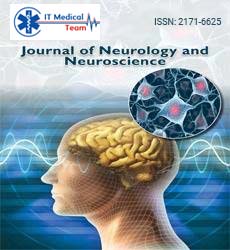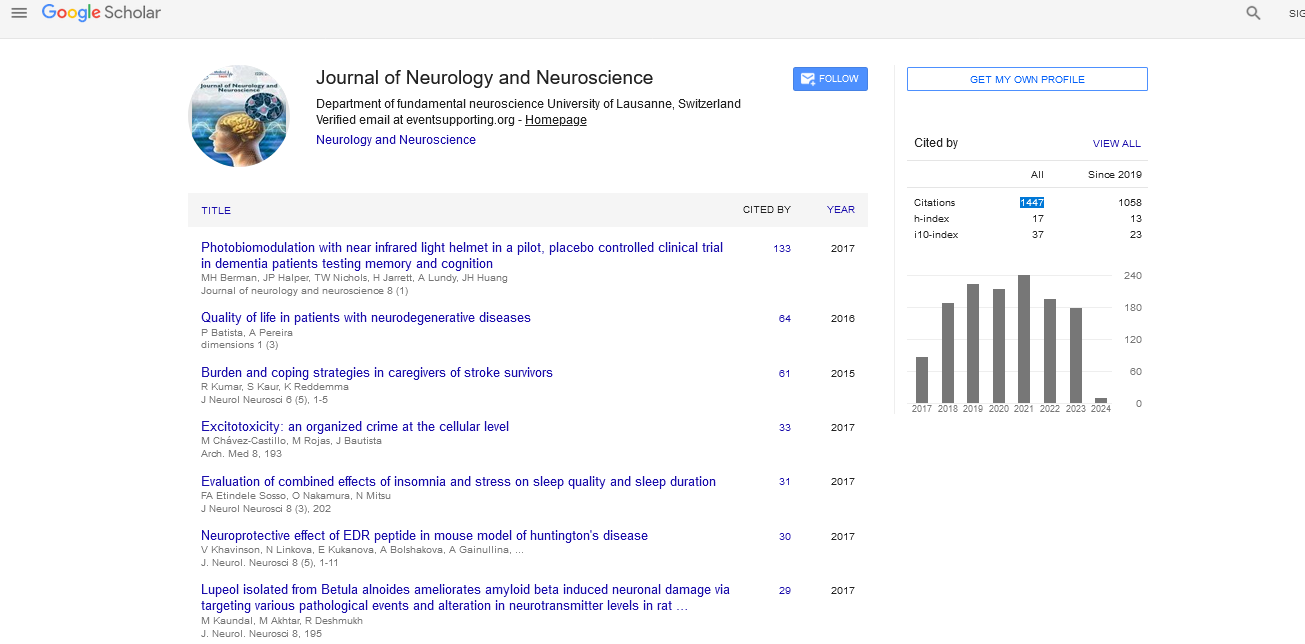Short Communication - (2023) Volume 0, Issue 0
Does Pedophile Obsessive-Compulsive Disorder (POCD) Promote Neuroinflammatory Pathways while Alleviating Neurogenesis?
Piplu Bhuiyan and
Yanning Qian*
Department of Anesthesiology, The First Affiliated Hospital of Nanjing Medical University, Nanjing, 210029, Jiangsu, People’s Republic of China,, China
*Correspondence:
Yanning Qian, Department of Anesthesiology, The First Affiliated Hospital of Nanjing Medical University,
Nanjing, 210029, Jiangsu, People’s Republic of China,,
China,
Email: ,
Received: 22-May-2023, Manuscript No. IPJNN-23-13776;
Editor assigned: 24-May-2023, Pre QC No. IPJNN-23-13776 (PQ);
Reviewed: 07-Jun-2023, QC No. IPJNN-23-13776;
Revised: 14-Jun-2023, Manuscript No. IPJNN-23-13776 (R);
Published:
21-Jun-2023, DOI: 10.4172/2171-6625.23.S6.003
About the Study
According to a growing body of scientific research reveal that
surgical trauma can stimulate the innate immune system, which
in turn activates peripheral immune cells which resulting in
Blood Brain Barrier (BBB) disruption turn to trigger neuronal and
glial cells activation, causing the release of inflammatory
mediators leading to POCD pathogenesis and impair
neurogenesis. The pathophysiology behind the processes of
POCD is increasingly focusing on the roles of oxidative stress and
neuroinflammation, which are both prominently associated with
anaesthesia and surgery. Focusing on discovering novel
treatment targets based on their capacity to biological signalling
network pathways in POCD, surgery-induced inflammation
creates long-term repercussions that cause cognitive deficits.
However, we are far away from a common hypothesis how and
why peripheral innate immune mechanisms affect brain
immunity, leading to neuroinflammatory and cognitive
impairment in POCD.
Bhuiyan and his colleagues employed bioinformatics and
systems biology approaches to investigate the potential hub
genes that are differentially expressed and associated with
mechanisms involving inflammatory, neurogenesis, and
modulation of synaptic transmission and also repurposing drug
inhibitors in POCD [1]. According to our network biology
analysis, we postulate that POCD may directly affect neuronal
biological responses by altering intraneuronal pathways such as
neurogenesis, neuron differentiation, postsynaptic transmission,
catabolic processes of neuroimmune activity, and cellular
protein modification of neuronal cells. The uncovering of the
hub genes (AKT1, CHUK, PRKCZ, TYMS, RBBP4, BPTF and AKT2)
implicated in important neuroimmune and neuroinflammatory
signaling pathways in the pathogenesis of POCD was made
possible by the use of different omics approaches integrating
protein-protein interaction. This is the very first instance in
which bioinformatics network-based integrative approaches
have been implemented to elucidate numerous complex
signaling pathways, such as the CD40L signaling pathway, AKT
phosphorylation of cytosolic targets, TNFR2 signaling pathway,
EGF receptor signaling pathway, PDGF signaling pathway,
nicotinic acetylcholine receptor signaling pathway, Alzheimer disease-amyloid secretase pathway, FGF signaling pathway,
chaperones that modulate interferon signaling pathway, IL17
signaling pathway, and AGE/RAGE pathway that is suggested to
involve in the pathogenesis of POCD. To support our idea, it is
imperative to conduct wet lab research and explore novel
therapeutic interventions.
By drastically reducing the production of Brain-Derived
Neurotrophic Factor (BDNF), a crucial protein that encourages
neuronal survival and development, neuroinflammation, a
frequent response to surgical trauma, may impede neurogenesis
[2]. By affecting the function of neurotransmitters and receptors
that regulate neuronal proliferation and maturation, where
anesthesia, which is frequently used during surgery, can also
have an impact on neurogenesis. The hippocampus, which is
important in memory formation and consolidation, as well as
synaptic plasticity and learning in different regions of the brain,
may be impaired by POCD [3,4]. Genes involved in synaptic
plasticity, such as BDNF and glutamate receptor subunits, may
have altered epigenetic states as a result of POCD. The term
"epigenetics" describes alterations to DNA or histone proteins
that modify gene expression without altering DNA sequence.
Environmental triggers like stress or anesthesia can cause
epigenetic alterations, which can last for a very long time. By
controlling the transcription of genes that encode synaptic
proteins or by altering the accessibility of chromatin to
transcription factors, epigenetic alterations can have an impact
on synaptic plasticity. As a result, the balance between
neuroinflammation and neurogenesis in the brain could
potentially have an impact on POCD. POCD may be prevented or
treated using therapies that can modify these processes, such as
anti-inflammatory medications, preconditioning, or cognitive
training [5]. Therefore, we speculate that it will open up a new
window for research into the pathophysiology of POCD, with a
particular emphasis on how neuroinflammation is related to
impair neurogenesis.
References
- Bhuiyan P, Chuwdhury GS, Sun Z, Chen Y, Dong H, A et al. (2022) Network biology approaches to uncover therapeutic targets associated with molecular signaling pathways from circrna in postoperative cognitive dysfunction pathogenesis. J Mol Neurosci 72:1875-1901.
[Crossref] [Google scholar] [PubMed]
- Travica N, Aslam H, Neil A, Lane MM, Berk M, et al. (2022) brain derived neurotrophic factor in perioperative neurocognitive disorders: current evidence and future directions. Neurobiol Learn Mem 193:107656.
[Crossref] [Google scholar] [PubMed]
- Abraham W C, Jones O D, Glanzman D L (2019) Is plasticity of synapses the mechanism of long-term memory storage?. NPJ Sci Learn4:9.
[Crossref] [Google scholar] [PubMed]
- Payeur A, Guerguiev J, Zenke F, Richards BA, Naud R (2021) Burst-dependent synaptic plasticity can coordinate learning in hierarchical circuits. Nat Neurosci 24: 1010-1019.
[Crossref] [Google scholar] [PubMed]
- Alam A, Hana Z, Jin Z, Suen KC, Ma D (2018) Surgery, neuroinflammation and cognitive impairment. EBioMedicine 37:547-556.
[Crossref] [Google scholar] [PubMed]
Citation: Bhuiyan P, Qian Y (2023) Does Pedophile Obsessive-Compulsive Disorder (POCD) Promote Neuroinflammatory Pathways while Alleviating Neurogenesis? J Neurol Neurosci Vol.14 No.S6:003





